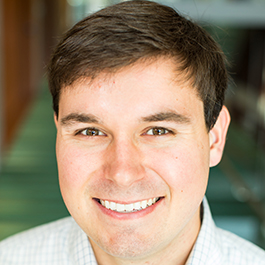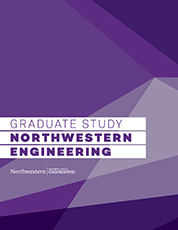Designing a Better ICU Experience
Chris Baggott (EDI '20) looks back on his EDI thesis project and the impact he hopes it can have on intensive care units.

Chris Baggott wants to help improve the ICU experience.
Baggott (EDI '20) created Unifi as his thesis project in Northwestern's Engineering Design Innovation (EDI) program. The app provides structure and consistency to family meetings and ensures that care teams are on the same page as family members. It also builds trust and transparency into the care-planning process thanks to the use of family-focused visuals.
Baggott recently took time to reflect on the experience of developing Unifi and his hope for the impact the app can have in ICUs.
Why did you want to pursue Unifi as your EDI thesis project?
I have been interested in healthcare for a long time, and I see it as a natural fit for designers because it's a very rich problem space. This specific project came about through a partnership with a research team at Northwestern Memorial Hospital, where I interned over the summer. I quickly developed a keen interest in applying design principles to improving the ICU experience, and the thesis project grew organically out of the partnership with the doctors and researchers at the hospital.
What problem did you see Unifi addressing?
At its most basic level, Unifi is a planning and communication tool for care teams and families. I found many areas where the natural complexity and fast-paced nature of the ICU setting caused conflict, frustration, or other negative feelings in both care providers and families. My goal was for Unifi to add transparency and structure to the care-planning process, two things that are often lacking in the current ICU experience.
By building a tool that facilitates moments of reflection on the care team, and designing for better inclusion of family input, the app provides a centralized location for care-planning information and makes the process more transparent and understandable to families. It also makes it easier for new care-team members to stay up-to-date on all the discussions related to care planning.
What are some examples of the visuals that would be included in Unifi?
The two basic types of visuals I included are a pre-meeting guide and a post-meeting summary. The pre-meeting guide is a physical sheet of paper that is brought to the meeting. It prompts the physician leading the discussion to think about family-friendly ways to convey important information, and it also ensures that topics aren’t missed during the meeting. One example could be a clear discussion of a timeline and a date for the next meeting.
The post-meeting summary is important for both the care team and the family. It clearly articulates the plan of care, and once it’s in the hands of the family they can use it to reference information they may have forgotten as well as add notes or questions right on the paper. This summary also lives in the electronic record and makes it easy for team members who didn’t attend to understand who was at the meeting, and what was discussed. Social workers I spoke to were enthusiastic about the visuals and thought they would be particularly useful for families.
What were the biggest challenges you faced?
Research was a big challenge due to the limitations on access to hospitals due to the COVID-19 pandemic. Time was also a challenging factor since, in the medical field, solutions are usually developed and tested over years, not months. Fortunately, the hospital-care professionals I worked with were eager to help and adopted the sprint mindset that designers try to bring to their projects.
What role, if any, did the thesis project play in your consideration to enroll in EDI?
The thesis project played a significant role in my desire to join EDI. It was appealing to me to own a project from start to finish. I felt the thesis project would give me invaluable experience that would translate directly to my future career, specifically project planning, self-reliance, and even presentation skills — not to mention it guaranteed a high-quality centerpiece for my design portfolio that demonstrates the breadth of my skills.
What did you learn from the experience?
The true amount of things I learned is probably too hard to quantify or list individually, but some main themes stand out when I reflect on the project. The thesis project taught me to strategically and effectively use my resources, including my peers and mentors, even when the time or budget might be limited. Because I spent significant time working with non-designer stakeholders at the hospital, I now have greater confidence in explaining my process and communicating my concepts clearly to a broad audience. Finally, I think the experience helped show me what I'm capable of if I put in the effort, and what are my best ways to manage time and motivate myself to stay on track along the way.
How do you think this project will prepare you for life after EDI?
I keep coming back to "confidence" here. The knowledge that I completed a rigorous thesis project helps me feel prepared for design challenges down the road, whatever they might be. I also know when and how to ask for help from others and incorporate useful feedback, which I think are both critical to success in future projects.
What advice would you give to a prospective student considering EDI?
One of the best things about the program was the freedom to explore my interests and develop ones that I didn't even know I had. My biggest advice is to step outside your comfort zone. Even if you think you know exactly what your interests are and which career you want to pursue, keep an open mind, and you might be surprised at the things you learn along the way. I certainly came out of the program with different plans than I had going in, and I credit that to an EDI mindset that encourages exploration while still providing a supportive environment.
This post is part of a series of stories that examines EDI thesis projects.

